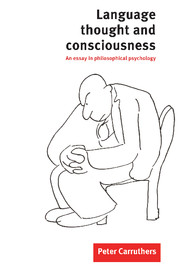Book contents
- Frontmatter
- Contents
- Preface
- Introduction
- 1 The geography of the issues
- 2 Which language do we think with?
- 3 Thought-based semantics
- 4 Holism and language
- 5 First steps towards a theory of consciousness
- 6 Second (-order) steps towards a theory of consciousness
- 7 A reflexive thinking theory of consciousness
- 8 The involvement of language in conscious thinking
- Conclusion
- References
- Index
8 - The involvement of language in conscious thinking
Published online by Cambridge University Press: 01 June 2011
- Frontmatter
- Contents
- Preface
- Introduction
- 1 The geography of the issues
- 2 Which language do we think with?
- 3 Thought-based semantics
- 4 Holism and language
- 5 First steps towards a theory of consciousness
- 6 Second (-order) steps towards a theory of consciousness
- 7 A reflexive thinking theory of consciousness
- 8 The involvement of language in conscious thinking
- Conclusion
- References
- Index
Summary
In the last chapter I presented, and defended, a non-species-specific account of the distinction between conscious and non-conscious mental states. I concluded that RT theory at least provides the best available account of the structure of human consciousness, and that it successfully describes the sort of cognitive architecture that any organism, of whatever variety, would have to instantiate if it is to be capable of conscious episodic thinking. In the present chapter I shall argue that there is a natural necessity attaching to the fact that such conscious thinking – in the case of human beings, at any rate – often involves natural language. I shall distinguish weaker and stronger versions of this natural necessity thesis, and argue tentatively in support of each.
An architecture for human thinking
My first task is to sketch the outline of an architecture for human cognition (or rather, of that fragment of human cognition which specifically concerns us). This outline-architecture is designed to do two things. First, it should instantiate the RT model of consciousness, already explained and defended in Chapter 7. Second, it should explain the introspective datum of Chapter 2, that much of human conscious thinking appears to take place in natural language. Not only should it explain that datum, indeed, but it should provide an explanation which accords with our common-sense construal of it – namely, that much of our conscious thinking does take place in natural language.
- Type
- Chapter
- Information
- Language, Thought and ConsciousnessAn Essay in Philosophical Psychology, pp. 225 - 276Publisher: Cambridge University PressPrint publication year: 1996



